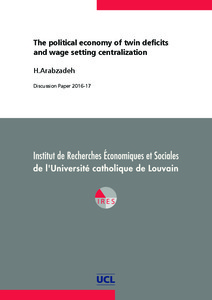The political economy of twin deficits and wage setting centralization

Université catholique de Louvain. Institut de recherches économiques et sociales
UCL - Louvain-la Neuve
2016
70 p.
centralization ; collective bargaining ; government policy ; national budget ; wages
Discussion Paper
2016-17
Public finance and taxation
English
Bibliogr.
"This paper contributes to the literature on current account imbalances. Econometric analysis of the paper finds evidence that wage centralization, in a cross-section of industrialized economies, significantly improve current accounts through reducing budget deficits. To explain this empirical finding, the paper provides a political economy framework in which the government follows preferences of N-sector workers (majority rule). An increase in public and so, current account deficits by issuing external public debt leads to real appreciation of the currency. As between-sector mobility is constrained by friction in the labor market, wages in N-sector rises. The opposite happens if the government improves the two balances by rising its saving. Thus, N-sector workers relatively support (oppose) more a rise (reform) in the two deficits. Centralization of wage bargaining moderates the benefit and costs from such twin-deficit policies by reducing the responsiveness of sectoral wage with respect to sectoral prices. Thus, the more centralized is the wage determination, the less N-sector workers support (oppose) a rise (reform) in the two deficits. Correspondingly, more centralized wage bargaining reduces the government's political incentive (cost) to deteriorate (reform) the external balance through the fiscal balance."
Digital
The ETUI is co-funded by the European Union. Views and opinions expressed are however those of the author(s) only and do not necessarily reflect those of the European Union or the ETUI.